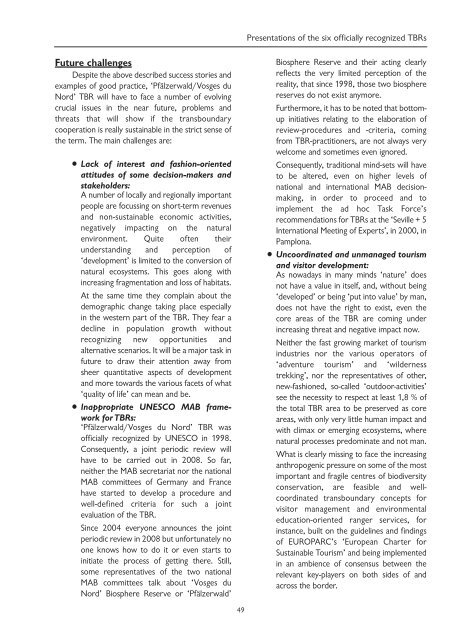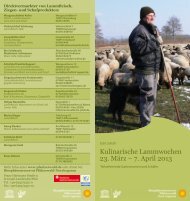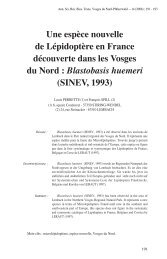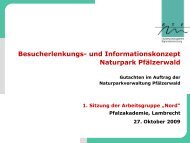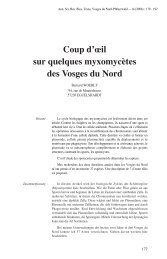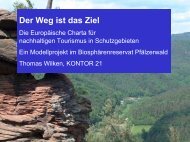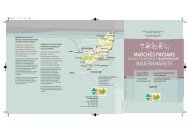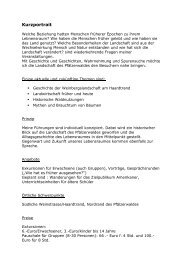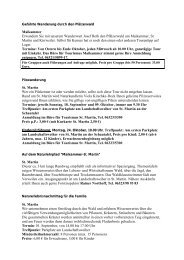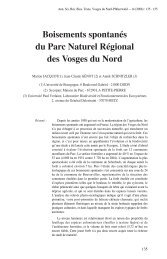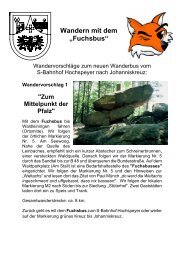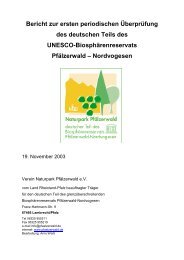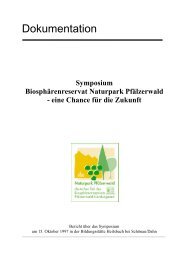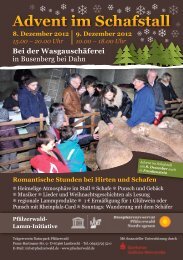Transboundary Biosphere Reserves - Naturpark Pfälzerwald
Transboundary Biosphere Reserves - Naturpark Pfälzerwald
Transboundary Biosphere Reserves - Naturpark Pfälzerwald
You also want an ePaper? Increase the reach of your titles
YUMPU automatically turns print PDFs into web optimized ePapers that Google loves.
Presentations of the six officially recognized TBRs<br />
Future challenges<br />
Despite the above described success stories and<br />
examples of good practice, ‘Pfälzerwald/Vosges du<br />
Nord’ TBR will have to face a number of evolving<br />
crucial issues in the near future, problems and<br />
threats that will show if the transboundary<br />
cooperation is really sustainable in the strict sense of<br />
the term. The main challenges are:<br />
● Lack of interest and fashion-oriented<br />
attitudes of some decision-makers and<br />
stakeholders:<br />
A number of locally and regionally important<br />
people are focussing on short-term revenues<br />
and non-sustainable economic activities,<br />
negatively impacting on the natural<br />
environment. Quite often their<br />
understanding and perception of<br />
‘development’ is limited to the conversion of<br />
natural ecosystems. This goes along with<br />
increasing fragmentation and loss of habitats.<br />
At the same time they complain about the<br />
demographic change taking place especially<br />
in the western part of the TBR. They fear a<br />
decline in population growth without<br />
recognizing new opportunities and<br />
alternative scenarios. It will be a major task in<br />
future to draw their attention away from<br />
sheer quantitative aspects of development<br />
and more towards the various facets of what<br />
‘quality of life’ can mean and be.<br />
● Inappropriate UNESCO MAB framework<br />
for TBRs:<br />
‘Pfälzerwald/Vosges du Nord’ TBR was<br />
officially recognized by UNESCO in 1998.<br />
Consequently, a joint periodic review will<br />
have to be carried out in 2008. So far,<br />
neither the MAB secretariat nor the national<br />
MAB committees of Germany and France<br />
have started to develop a procedure and<br />
well-defined criteria for such a joint<br />
evaluation of the TBR.<br />
Since 2004 everyone announces the joint<br />
periodic review in 2008 but unfortunately no<br />
one knows how to do it or even starts to<br />
initiate the process of getting there. Still,<br />
some representatives of the two national<br />
MAB committees talk about ‘Vosges du<br />
Nord’ <strong>Biosphere</strong> Reserve or ‘Pfälzerwald’<br />
<strong>Biosphere</strong> Reserve and their acting clearly<br />
reflects the very limited perception of the<br />
reality, that since 1998, those two biosphere<br />
reserves do not exist anymore.<br />
Furthermore, it has to be noted that bottomup<br />
initiatives relating to the elaboration of<br />
review-procedures and -criteria, coming<br />
from TBR-practitioners, are not always very<br />
welcome and sometimes even ignored.<br />
Consequently, traditional mind-sets will have<br />
to be altered, even on higher levels of<br />
national and international MAB decisionmaking,<br />
in order to proceed and to<br />
implement the ad hoc Task Force’s<br />
recommendations for TBRs at the ‘Seville + 5<br />
International Meeting of Experts’, in 2000, in<br />
Pamplona.<br />
● Uncoordinated and unmanaged tourism<br />
and visitor development:<br />
As nowadays in many minds ‘nature’ does<br />
not have a value in itself, and, without being<br />
‘developed’ or being ‘put into value’ by man,<br />
does not have the right to exist, even the<br />
core areas of the TBR are coming under<br />
increasing threat and negative impact now.<br />
Neither the fast growing market of tourism<br />
industries nor the various operators of<br />
‘adventure tourism’ and ‘wilderness<br />
trekking’, nor the representatives of other,<br />
new-fashioned, so-called ‘outdoor-activities’<br />
see the necessity to respect at least 1,8 % of<br />
the total TBR area to be preserved as core<br />
areas, with only very little human impact and<br />
with climax or emerging ecosystems, where<br />
natural processes predominate and not man.<br />
What is clearly missing to face the increasing<br />
anthropogenic pressure on some of the most<br />
important and fragile centres of biodiversity<br />
conservation, are feasible and wellcoordinated<br />
transboundary concepts for<br />
visitor management and environmental<br />
education-oriented ranger services, for<br />
instance, built on the guidelines and findings<br />
of EUROPARC’s ‘European Charter for<br />
Sustainable Tourism’ and being implemented<br />
in an ambience of consensus between the<br />
relevant key-players on both sides of and<br />
across the border.<br />
49


